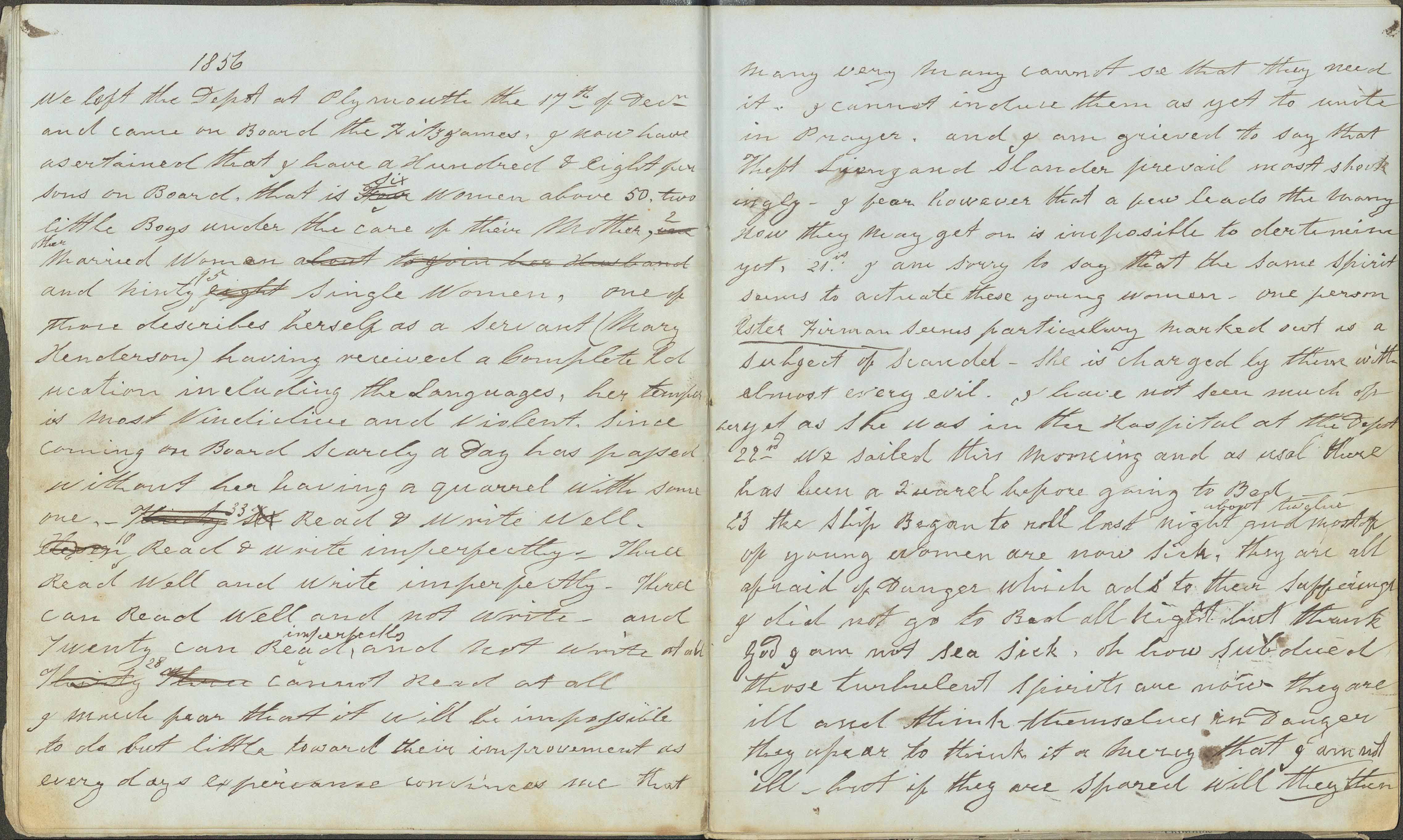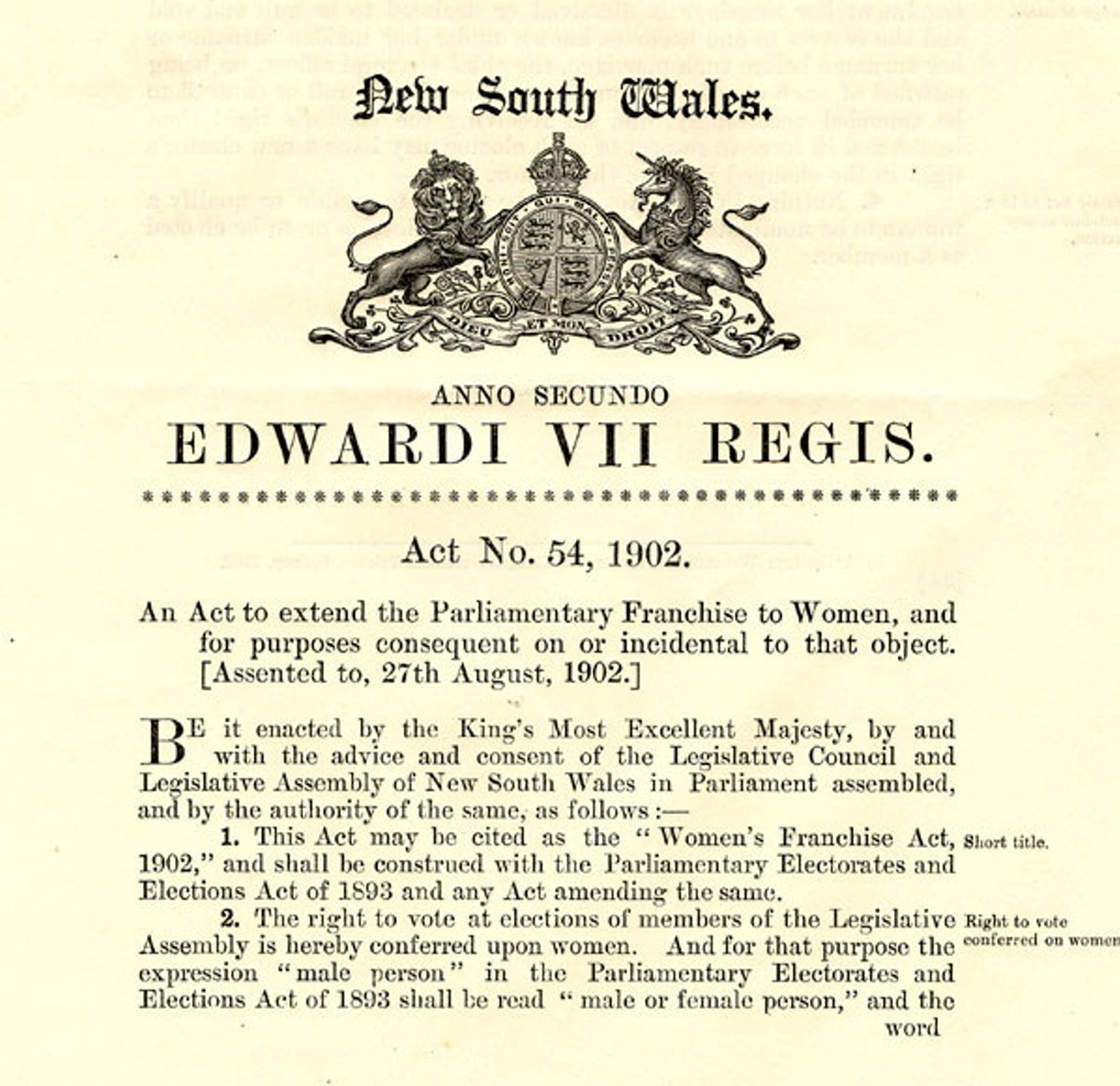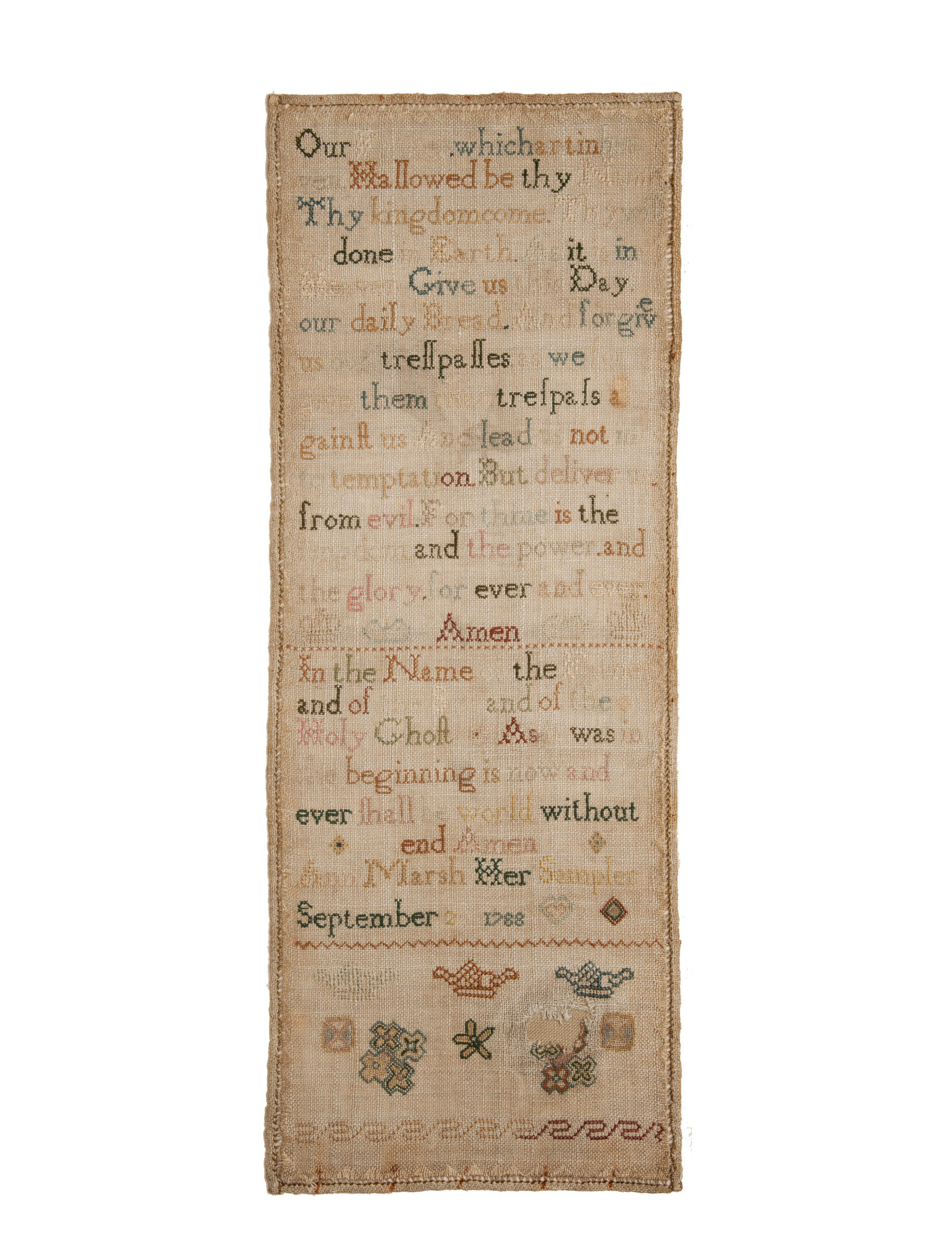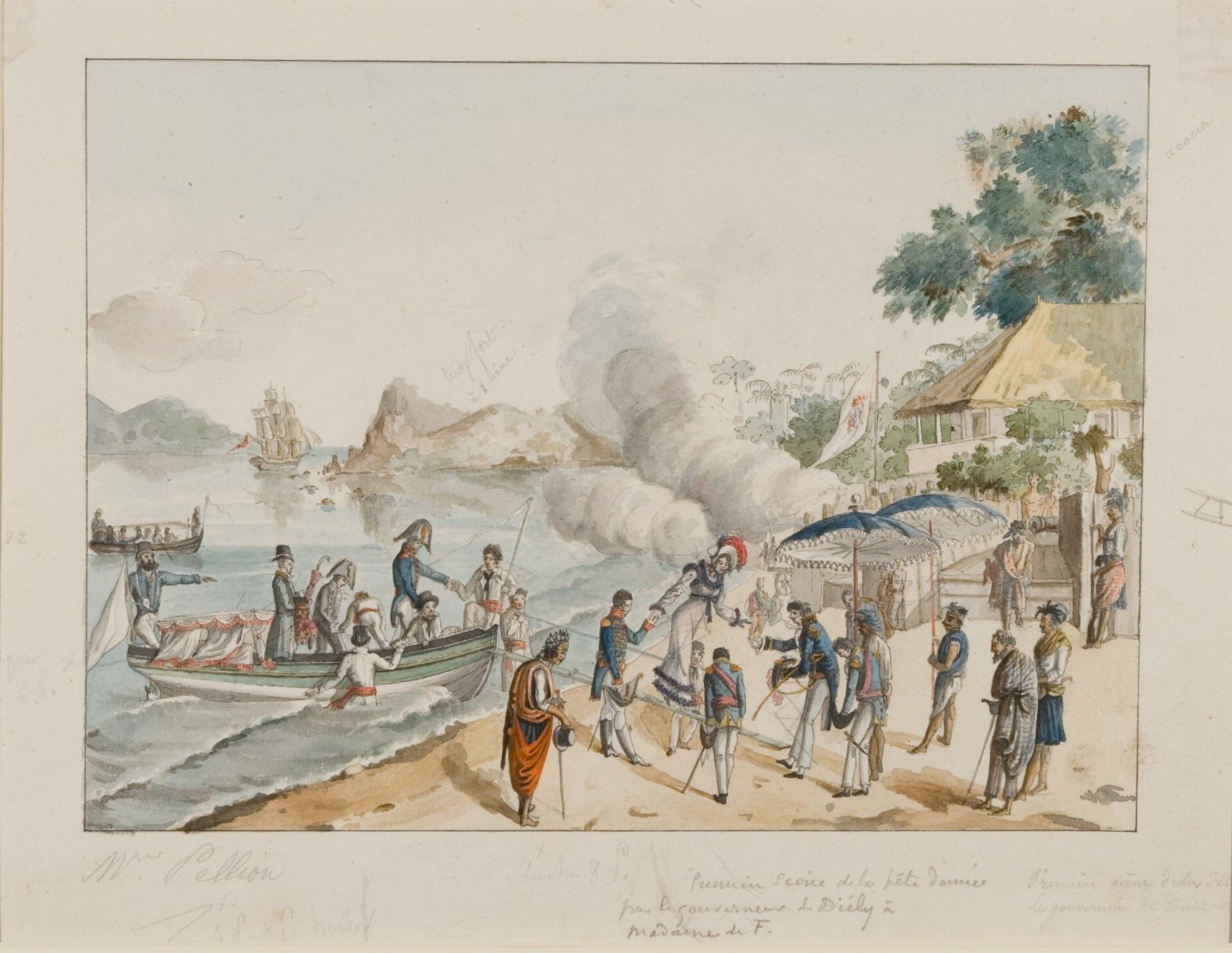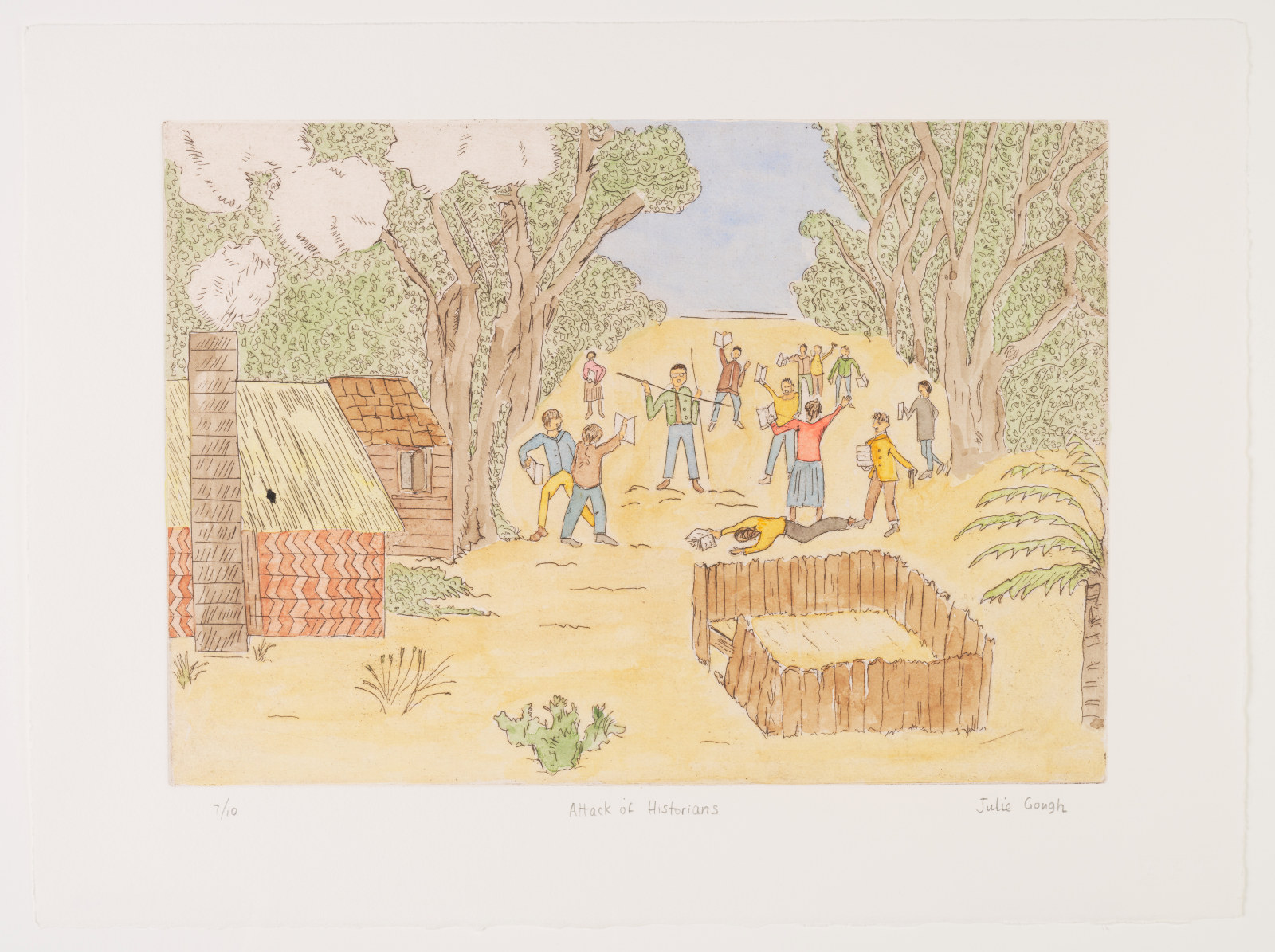1857
Jany 7th -
We have today again given the rest
of the young women a bonnet each from print
& calico, also cotton tape & needles and have
supplied them with knitting cotton to
put drawings in them, a hundred & six
have now received them, they are all now
making them as the weather is vey hot
& they require them to protect their faces
from the sun, all but one (received them
in the presence of the Doctor) and she coming
afterward I enquired why she did so, she
told me she had been washing on the Main
Deck & should do so when she chose (The day
for washing is Fridays) she then abused Mrs
Magee (The Sub Matron) fearfuly indeed
she is generaly a very abusive Obstinate young
woman, one of those who on the 28th of Dec
conducted themselves so disgracefuly about the
water as stated before, her name I find to be
Bridget Ryan, 8th -
The girls are walking
on the Poop most of them with their new bonnets
on. Would to God that they only knew the thing
which belong to their eternal peace
---
9th -
I am happy to say that the Irish girls are very
anxious to be employed and have been supplied
with knitting & all are now well, but again do their
angry passions shew themselves, if their future well doing do
depended on each other I fear the prospect would indeed
be dreary - few very few but now shew themselves in
their true coulars and it is a sad picture to look
upon. Mary Henderson is still the same spirit of evil
but I hope that she will soon get tired -------
11th We have had Church service today the young
people have quite enjoyed it. I have much to Bear
from Fanny Collins She behaves herself so immodestly and
endeavours so continualy to mix with the young men
that I have remonstrated with her but she will take
no advice but tells me she will do as she likes - - -
13th When I look around me on these young people I can
scarcely fancy that one of them can be a thief & yet
there is not a day passes without their stealing one
from the other and today I find that I have lost
three chemese out of five which I had with there
work. 14th We have today searched all the beds and
bags but have found nothing of the lost articles
I fear there are those here who receive stolen goods
---
as well as in large Towns on land
Fanny Collins has again been using abusive language
because some Calico belonging to her was taken
from her bag as was the case with others (by the desire
of the Surgeon) to be compared with the two remaining
chemese I have left - if I quietly speak to her
of her faults she is insolent beyond description saying
how dare you speak to me God only knows what
will become of her for she for is not a servant.
16th -
have not suceeded in finding what I have lost
nor do I hope to do so now - I feel how responsible is my
situation among those under my care - nor can I find
one among them I can call fraind. Their tempers
talents religion & disposition are so varied that it re
quires something more than normal strength to
keep any order among them. There is not a night that
we go to sleep without a quarrel either before or after
going to bed and after it once commences it becomes
very soon general and them the din and noise is awful
still I doubt if any of them were or will be again
so excitable as they are here when once they get
more settled, everything on board ship is new
to most and full of excitement to all
---
18th Once more it is Sundy night but how unlike
Sundy at home, still we have had prayers on deck
but when one remembers that on the Sabbath one
could always hear at least one sermon. it makes
me look back, back with the Psalmist and say one
day in Thy Courts O Lord are better than a thousand
elsewhere. Still the torrent of evil passions prevail
among us Envy Hatred Malice and all uncharitable
ness. Fanny Collins is still a very great trial to
me, as soon as I speak she interferes and is constantly
using language too shocking to name here -----(?)
Thy Lord turn her heart and head her in the right
way or she will be a curse to the Colony she is now
going to - yet thank God I have great cause to be
hopeful for I believe the thoroughly depraved are very
few, although they do sometimes succeed in hurting [?]
the rest by their lies and slander - - - -
19th I can scarcely record my thoughts if I try to
do so nor the occurances of the day, some of the young
women have circulated most vile reports but
I cannot find out who is the author but oh how
shocking that any such things should take place
for if true how unfit are the accused to be wives
---
and mothers of the future Australians and if
untrue then are they equaly vile as the liar always
is. I have today reported Grace Hockin to the
Surgeon. This morning after the breakfast
was serve she remained in bed although in
perfect health I remonstrated with her partic
ulary as the Captain & Others of her ship [?] had often
complained of her extreme -------ness. I told her
she must get up before seven o’clock or I should
get the bed taken from her, or get some water used
for her as a Shower Bath. She replied in this way
if you were to do so you should never breathe
again. Can she realy mean this: Her general
conduct answers yes I fear so. I cannot find
out what she intends doing in Sidney…
20th Quarrels among each other still continue arising
out of the most trifling matters. Surly the -------(?)
is a fire a world of iniquity for behold how great
a matter a little -----(?) kindleth O that they were wise
and would consider this that they would consider
their latter end. I began to understand more
of the English prejudices against the Irish and
feel certain that nothing would make them
---
be happy together and it is much reg
retted that they cannot be placed in separate ap
partments instead of being mixed up as they
are where my frainds obtained for me the
situation of Matron they supposed I should
be very well taken care of on my voyage that
is to have advantages beyond what I could
get otherwise but they will be sadly disappointed
to know that I cannot often get a nights rest
this is not to be wondered at for there is no employ
ment for them by day and the consequence is
they cannot sleep at night. The sub matrons
are all afraid to take any part in keeping order
as they are daily witnesses to the conduct of many
when reproved by me every indulgence that kind
ness can suggest is given to them by the Surgeon
& the Captain consistant with the Regulations but
anything like gratitude they do not understand
everyone came in for a share of their slander
the Surgeon & myself included. one thing is
certain those who First conducted themselves
so disgracefully here did not learn it here but
must have been accustomed to scenes of vice
and immorality long since
---
21st -
I have nothing pleasant to write about the
Surgeon has determined that none of the single
women shall at anytime or on any account go to
the Dispensary unless accompanied by myself
or one of the Sub Matrons, but how disgraceful
that any should require an escort, yet it is
those who do require it who feel or pretend to do
so that complain of the Regulation. the more res
pectable think it is a protection to their character
how a few of them obtained a passage I cannot imagine for
grapes do not grow on thorns or figs on thistles
and it will be as easy for the Ethiopian or the Leopard
the one to change his skin the other his spots as for
a confirmed liar to become truthful, of for the
habitual thief to become honest.
22nd we have been compelled to give up our School
although so many cannot read indeed the English
are equally careless as the Irish of improving
themselves. I do not mean that those are the worst to
mange for the best educated are generally the worst
Conducted here so far. I am sure we might be
happy very so if it was not for the wickedness
of our own sinful hearts.
---
23rd how little capable of judging by appearance I feel
when I look back and consider the interest and sy
mpathy I felt toward Hester Firman and not me only
but also the Surgeon Sub matrons and many others yet
we have found her to most depraved & malicious per
son that we have met with here, being so quite and
apparently so inoffensive we all supposed her to so
but so far from being what we believed her, we find
her to be the most deceptive and wicked person that
can be imagined. May God forgive her and change
her heart we all thought that because Mary Henderson
was noisy & abusive that she invented what she
may times started. yet although she is malicious
when excited and will exaggerate if she has heard
any slander it does not appear that she is often the author
of her statements - but the former will invent and repeat
the most shocking falsehoods. She came out of the
hospital the 20th and has barely escaped the jaws of death
(yet even) while in the Hospital (and receiving the
greatest attention & care from the Surgeon and kindness
and sympathy from every on who was permitted to
visit her) she was scheming and plotting to defame
the characters of many of the other young people
---
and she has been making a profession of Religion
also but now she announced it her intention
to join the Roman Catholicks, this is evidently
intended to win to her support the Irish, as they
are by far the Strongest Party. The English number
but thirty one. She has stated that several
young English women have had children without having
been wives -one but of those she has named there is not
that she ever saw before she left London for Plymouth
and others not untill she met them in the Depot
in Plymouth. what will be the result I do not know
26th yesterday passed I am happy to state in peace
Hester F was not allowed to come on the poop at all
we had prayers on the poop the heat is not so great
consequently the tempers are a little cooler --------
From my former experience in large Hospitals in London I
believe there is about the same amount if ill temper scan
del and such like evils here (in proportion to numbers)
as is generally found where large masses of people happen
(from whatever the cause) to be together for any length of time
one great evil is the want of constant employment many (?)
if those here being nothing but what is made up with them
and consequently the work supplied by the Ladies Committee
I did not get from the Doctor near all the contents
---
is soon exhausted. When therefore this is the case
Dr Watts truly says that Satan finds some mischief
still for idle hands to do – but perhaps this cannot
be remedied. There are but a few who employ much time
in Reading Religious or useful books ------------
30th the weather is intensely hot but I do not see any
thing new worth notice here. There has been a difficulty
in getting the Room kept clean but now I am happy
to say it is well & regularly done -------------
29th I very much fear that the unhappiness cause by Hester
will be felt severely by us all while in this ship what little
confidence there was is now destroyed I fear, and di
strust and suspicion are the feelings of all, for every ones
face expresses it. That the Surgeon had been censured (?)
basely and cruelly (if the truth could be found out) by
others beside H F appears certain – but the motive for
it will no doubt forever remain a mystery………..
Feb 1st I am thankful that all the young women
are comparatively well and the weather has been much cooler
than it has been, although they have felt when so hot
a little exhausted yet we have had no very serious
case of illness lately. The Surgeon being careful to notice
every trifling illness which occurs among them
